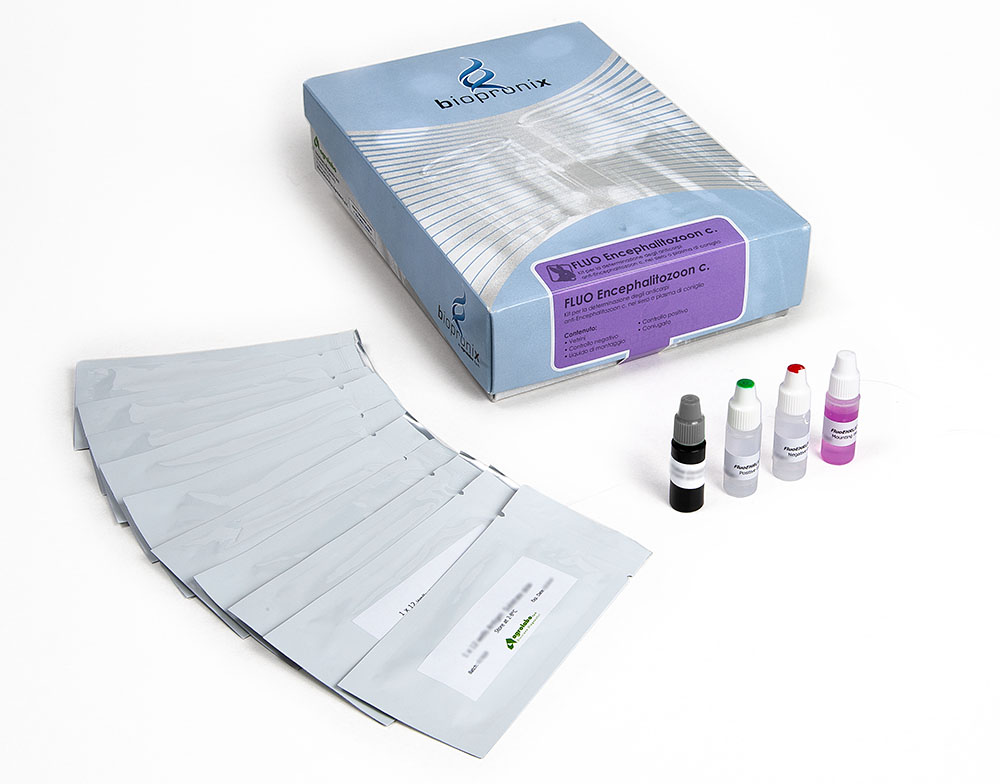FLUO ENCEPHALITOZOON cuniculi
IFA kit for the detection of IgG antibodies to Encephalitozoon cuniculi
Fluo ENCEPHALITOZOON cuniculi is a test based on the immunofluorescence technique for the detection of anti-Encephalitozoon cuniculi IgG antibodies in rabbit serum or plasma samples.
Encephalitoozonosis is a serious disease affecting rabbits and other species, although it rarely manifests itself in a truly severe form in a species other than the rabbit.
Usually the rabbit becomes infected through spores present in food contaminated with infected urine.
The spores are released in the urine six weeks after infection and have the ability to survive in the environment for four weeks. The infection usually affects the kidneys, central and crystalline nervous systems, and less commonly it can also affect the myocardium, spleen and liver.
There is also a transplacental route of transmission, so it means that the fetus can be infected during pregnancy: in these cases the parasite can invade the lens, which causes inflammation of the iris and cataracts (when the lens becomes white).
At 3-4 weeks after the infection, we can find antibodies in circulation, while the spores, those that contribute to spreading the disease, can be find in the urine starting from 4 weeks after the infection and for a period of at least two months (the owner reported that in the weeks before the development of symptoms, the rabbit urinated more). In fact, rabbits eliminate the spores through the urine, which represent the true source of infection. Young rabbits probably contract the disease from their mother, while those who are housed outside also from the urine of other rodents or wild rabbits. If the rabbit is always indoors, it is less likely to become infected.
After the two months during which the rabbit eliminates the spores, it is no longer infectious. This means that a healthy adult rabbit is unlikely to be contagious if it does not have the disease. Greater risks arise with bunnies under four months of age who may have contracted the disease from their mother: this is why they should be placed in a quarantine at least until they reach 5 months of life.
The symptoms of rabbit encephalitozoonosis are highly variable and range from asymptomatic infections in which the rabbit hosts the parasite without having clinical signs, up to death. Most of the symptoms are caused by brain and kidney lesions, then we find those of the lens, heart and liver.
These are the symptoms of rabbit encephalitozoonosis:
- neurological symptoms: sudden death, changes in behavior, paresis or paralysis, nystagmus, stiff neck or twisted head, inability to stand, rolling to one side, ataxia, convulsions
- kidney symptoms: renal failure with weight loss, polyuria (urine often), polydipsia (drinks a lot), dehydration, urinary incontinence
- ocular symptoms: usually unilateral, cataract, hypopion, phacoclastic uveitis
However, these symptoms are not absolutely specific, we find them not only in encephalitozoonosis, but also in the course of pasteurellosis (caused by the bacterium Pasteurella multocida), toxoplasmosis (Toxoplasma gondii infection), trauma, brain tumors and ear infections.
